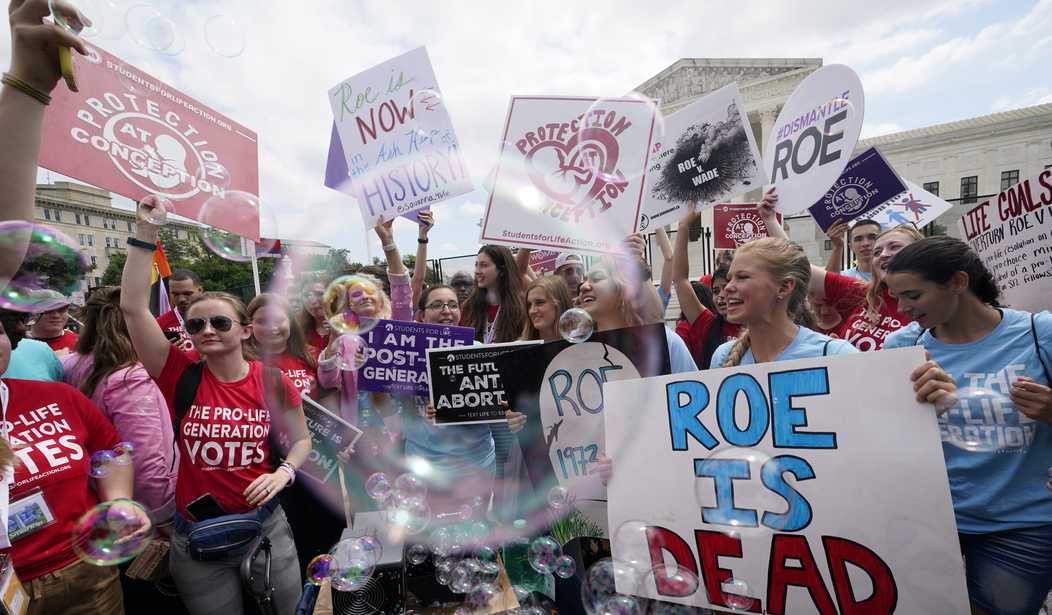Last week, Indiana passed an abortion ban, known as Senate Bill 1, which Gov. Eric Holcomb (R-IN) promptly signed into law. Much was made about how the state was the first to pass a near total abortion ban since the U.S. Supreme Court handed down Dobbs v. Jackson on June 24, which overturned Roe v. Wade, thus sending the abortion decision back to the individual states. Previously, Indiana had been something of an abortion destination, including for a 10-year-old rape victim from Ohio, though under Ohio state law, she did not need to travel out of state for the procedure.
Not as much as been made, however, about the opposition to the bill, which came from what initially may seem like unlikely sources, including from leading voices in the pro-life movement. SB1, especially before going through the Indiana House and the amendment process, had been something of a mess of exceptions.
Last month, Indiana Right to Life, the state affiliation of National Right to Life Committee (NRLC), released a statement opposing the bill.
National Right to Life Stands with Indiana Right to Life
— NRLC Communications (@nrlcomm) July 29, 2022
in Opposing Indiana’s SB 1
https://t.co/DzFfaNRwLd
A statement from NRLC read:
National Right to Life stands with its Indiana affiliate, Indiana Right to Life, in opposing SB 1.
Indiana’s SB 1 is a phony bill that would do the opposite of what its proponents claim that it would do. SB 1 would fail to protect lives and endanger vulnerable women and their unborn children.
SB 1 was drafted without consultation from any state, local or national pro-life group or expert. Instead, SB 1 was drafted with the advice from organizations and experts who have made abortion on demand part of their mission.
SB 1 contains vague language and ill-defined terms which would actually protect abortion instead of protecting unborn children. SB 1 also would undermine existing protections for unborn children with disabilities.
The pro-life movement calls upon pro-life legislators in the Indiana legislature to reject this travesty of a bill.
As the state affiliate communicated, with added emphasis to highlight more specific concerns with exceptions, from rape and incest, health exceptions, to fetal abnormalities, and the definition of an abortion:
Recommended
Indiana Right to Life remains opposed to SB1. While we are encouraged by the addition of language giving the attorney general the power to prosecute when illegal abortions occur, SB1 contains a vague life of the mother exception that will be easily exploited to cover most abortions. An amendment to help fix this problem was voted down last night, with the help of many Republican senators who previously indicated to voters on candidate surveys that they supported no exceptions, or a life of the mother exception only. SB1 lacks any requirement that claims of rape be reported to police, denying women the help they need while allowing perpetrators to escape justice and seek other victims. In addition, SB1 redefines abortion so that the intentional killing of a fully alive unborn child with severe disabilities will no longer be considered an abortion under Indiana law. This changing of definition will open the floodgates for funding of these types of procedures, while creating a bypass of Indiana’s banon discriminatory abortions based solely on disability, and a bypass of Indiana’s ban on trafficking of aborted fetal body parts, all because the killing of these children will no longer be called abortions under the law. To anyone who might claim this is an abortion ban, we would simply point to the section of SB1 referencing new rules for existing and future abortion clinics in Indiana. We did not wait 50 years for the full reversal of Roe vs. Wade for this. We stand opposed to SB1.
This came days after a July 25 press release from the organization, with even more strong words from NRLC President Carol Tobias, who emphasized "it is a complete disaster of a bill." Further, when it came to the "pro-life movement denounc[ing] this bill for what it is," she referred to it as "a wolf in sheep’s clothing designed to expand abortion on demand in the state of Indiana."
Additionally, there was a statement and a link to analysis from NRLC General Counsel James Bopp, Jr., who warned that a "careful legal examination of SB 1 reveals that, in nearly every provision, SB 1 uses defective language, lack of necessary safeguards, and lack of any effective enforcement mechanism that it results in abortion on demand."
Indiana Right to Life had also sent out on email on July 22, highlighting concerns with the bill that included allowing later abortions to continue on, had limited criminal penalties, a requirement for creating new rules on current and future abortion facilities, and "numerous instances of vague language that will create abortion providers will use to continue doing abortions."
Ultimately, Indiana Right to Life softened its stance, after, as mentioned, the bill went through amendments, which included tightening the exceptions for health of the mother.
When it comes to health exceptions, it's worth highlighting the concern pro-lifers had with how Doe v. Bolton, the companion case to Roe v. Wade, opened the door to elective abortions in the United States even up until birth. The exceptions put in place by the Court in Doe could mean anything the provider and the woman wanted it to mean, including mental and emotional health; whatever related to the woman's "wellbeing."
Under the strict confines of Roe and Doe, women had abortions later in pregnancy for the same socioeconomic reasons they might have had abortions earlier in pregnancy.
An updated statement from Indiana Right to Life's President and CEO Mike Fichter from August 5, when the bill was ultimately signed, noted that the affiliate "applaud[ed] House members those House members supporting the amendment for doing all they could to limit SB1’s exceptions." They ultimately "cannot fully endorse the amended SB1."
As the full statement from an emailed press release explained:
“Indiana Right to Life believes substantive changes to SB1 in the House provide renewed hope that over 95% of Indiana’s 8,414 abortions will end if it becomes law. House amendments will make abortion clinics a thing of the past in Indiana, requiring that abortions for limited circumstances be done in hospitals, or hospital-owned surgical centers. The House also tightened language for the life of the mother exception, limited abortions to ten weeks in circumstances of rape or incest, and limited abortions for lethal fetal anomalies to 20 weeks.
While we are disappointed that an amendment to limit abortions to only the life of the mother fell short in a roll call vote, we applaud those House members supporting the amendment for doing all they could to limit SB1’s exceptions. We will continue to work to build consensus going forward that all lives are to be valued, regardless of the means of one’s conception.
While we cannot fully endorse the amended SB1 due to it rape, incest, and lethal fetal anomaly exceptions, we acknowledge the path forward is either the potential to end the vast majority of abortions in Indiana, beginning with the closure of Indiana abortion clinics in mid-September, or allowing all abortions to continue under current law, as women from Ohio, Kentucky, and other states travel to Indiana for abortions. We urge every legislator to prayerfully consider how their vote will impact the path Indiana now chooses.”
Ultimately, exceptions for rape and incest and fatal fetal abnormalities remained in the bill.
When it comes to the health exception, the bill's text mentions a "serious health risk." According to the bill's text, this "means that in reasonable medical judgment, a condition exists that has complicated the mother's medical condition and necessitates an abortion to prevent death or a serious risk of substantial and irreversible physical impairment of a major bodily function." The text further clarifies this applies to physical health in that it "does not include psychological or emotional conditions. A medical condition may not be determined to exist based on a claim or diagnosis that the woman will engage in conduct that she intends to result in her death or in physical harm."
The bill will go into effect on September 15, at which point abortion facilities will effectively be forced to close their doors, since abortions will only be able to be performed at hospitals or hospital-owned outpatient centers.
In a post-Roe America, NRLC advises lawmakers to pass legislation that bans abortions except when it comes to protecting the life of the pregnant woman.
While SB1 may not be a perfect abortion ban--far from it--it's legislative path may nevertheless offer a compelling view on how states go about seeking to ban abortions now that the Supreme Court has given them the power once more to do so.

























